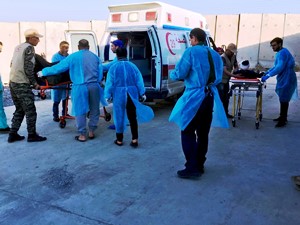 Health workers in Athba Field Hospital attend to trauma patients from west Mosul Photo credit/ASPENMosul, Iraq 29 March 2017: With medical capacities to treat severely wounded people significantly reduced due to conflict and coupled with the increased trend of traumatic injuries among civilians, the World Health Organization, the Federal Ministry of Health and Ninewa Department of Health has opened a trauma field hospital in Athba.
Health workers in Athba Field Hospital attend to trauma patients from west Mosul Photo credit/ASPENMosul, Iraq 29 March 2017: With medical capacities to treat severely wounded people significantly reduced due to conflict and coupled with the increased trend of traumatic injuries among civilians, the World Health Organization, the Federal Ministry of Health and Ninewa Department of Health has opened a trauma field hospital in Athba.
Located in Athba, 15 kilometres from the frontlines of west Mosul, the trauma field hospital has 2 operating theatres and 56 beds. Services include: triage; screening for new and referred patients from stabilization points; advanced life support; definitive wound management; basic fracture management; and a range of general and specialized lifesaving surgical capabilities. Other services include obstetric surgery and general emergency care. In the days ahead, it is expected that the hospital capacity will increase with an additional operating theatre and 20 beds, supported by UNFPA for emergency obstetric care services.
Days after its opening, 36 patients, including 30 civilians, were treated in the hospital; 39% of the total cases were females while 53% were children under 15 years. Managed by WHO’s implementing partner Aspen Medical, the field hospital is part of a larger trauma plan to provide a high level of medical care and strengthen the referral pathway. This will be achieved through support to trauma stabilization points on the frontline, setting up additional field hospitals, referring severe cases to specialized post-operative care services, increasing ambulatory care and rehabilitation services. A second trauma field hospital, located in Hamam al' Alil with similar capacity, is expected to open also as part of a joint initiative partnership among WHO, the Federal Ministry of Health, Ninewa Department of Health and UNFPA.
This unique first line response aimed at saving lives on the frontline was made possible through support from the UN Central Emergency Relief Fund (CERF), European Commission’s Humanitarian Aid Office (ECHO) and the Office of U.S. Foreign Disaster Assistance (USAID/OFDA).
WHO in support of the Ministry of Health is leading and coordinating the health cluster as well as trauma working group.
In light of vast trauma and other health needs, WHO and health partners under the Humanitarian Response Plan 2017 are appealing for US$ 110 million. These critical funds are needed to support health care interventions for 6.2 million people Iraq wide. The current funding gap of 85% will leave millions of people with limited access to lifesaving health care services and untreated injured patients at risk of physical and emotional lifelong disabilities.
Related links
UN Central Emergency Relief Fund
European Commission’s Humanitarian Aid Office
Office of U.S. Foreign Disaster Assistance
For more information please contact:
Pauline Ajello
Communications Officer
+964 7510101460
Ajyal Sultany
Communications Officer
+964 7510101469


